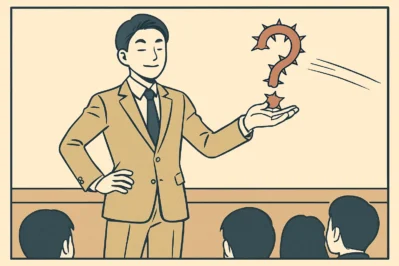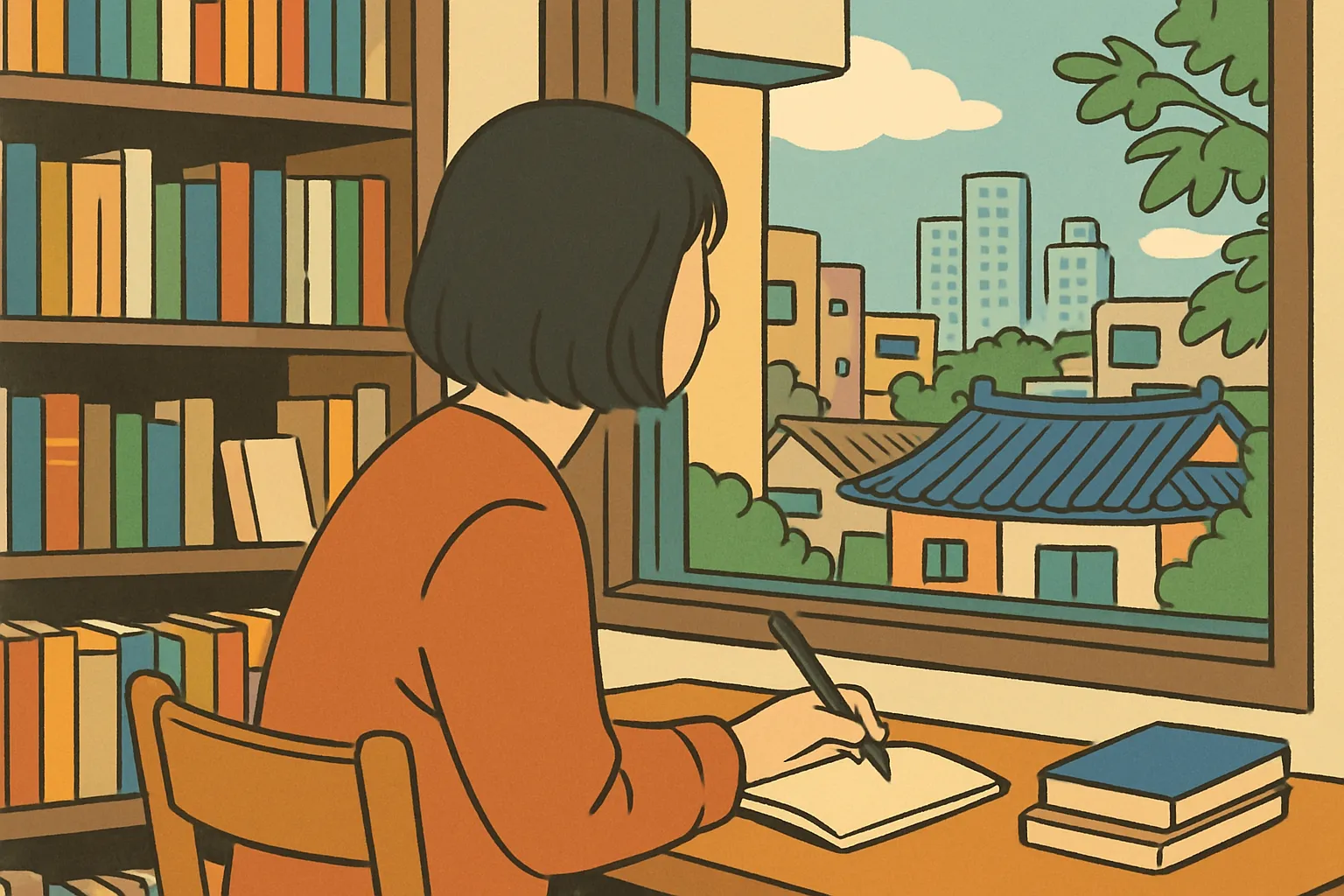Hello! This is Maeil Hangeul, here to upgrade your Korean skills!
Have you ever been in the middle of a presentation, feeling confident, and then someone asks a question that completely stumps you? Your mind goes blank, you start to sweat… we’ve all been there! Today, we’re going to learn how to handle those tricky, unexpected questions in Korean with grace and confidence.
You know how in recent K-dramas, there’s always that super-smart, charismatic character who can answer any question without breaking a sweat? Lately, these “뇌섹남/뇌섹녀” (brainy sexy man/woman) characters are super popular in Korea. Today, we’ll learn the essential phrases that will make you sound just as cool and collected when you’re in the hot seat.
Let’s get started!
Key Expressions for Your Q&A Toolkit
Here are three powerful phrases to help you master any Q&A session.
1. Acknowledging and Buying Time
- Korean: 좋은 질문입니다. 잠시 생각해 보겠습니다.
- Pronunciation [Romanized]: Jo-eun jilmun-imnida. Jamshi saenggakhae bogetseumnida.
- English Meaning: That’s a good question. Let me think about that for a moment.
- Detailed Explanation: This is your go-to phrase. It’s formal, polite, and incredibly effective. By saying “좋은 질문입니다” (That’s a good question), you compliment the person who asked, making them feel valued. Then, “잠시 생각해 보겠습니다” (Let me think for a moment) gives you precious seconds to organize your thoughts without looking flustered. It shows you’re taking the question seriously.
2. The Professional Follow-Up
- Korean: 그 부분에 대해서는 제가 확인해 보고 다시 말씀드리겠습니다.
- Pronunciation [Romanized]: Geu bubun-e daehaeseo-neun jega hwagin-hae bogo dashi malsseum-deurigetseumnida.
- English Meaning: Regarding that point, I will check and get back to you.
- Detailed Explanation: You don’t have to know everything! This phrase is a lifesaver when you genuinely don’t have the answer. It’s a very professional way to show responsibility and promise a follow-up.
- 그 부분에 대해서는 (Geu bubun-e daehaeseo-neun) – “Regarding that part/point…”
- 확인해 보고 (hwagin-hae bogo) – “…after I check/verify…”
- 다시 말씀드리겠습니다 (dashi malsseum-deurigetseumnida) – “…I will tell you again.” (A formal and polite expression)
3. Deferring to a Later Time
- Korean: 흥미로운 지적이시네요. 그 점은 발표 후에 더 자세히 논의하면 좋겠습니다.
- Pronunciation [Romanized]: Heungmiroun jijeog-isineyo. Geu jeom-eun balpyo hu-e deo jasehi nonuihamyeon joketseumnida.
- English Meaning: That’s an interesting point. It would be great if we could discuss that in more detail after the presentation.
- Detailed Explanation: Use this for questions that are great but might be off-topic or too specific for the entire audience. It acknowledges the value of the question (흥미로운 지적이시네요 – “That’s an interesting point/observation”) while politely suggesting to discuss it later (발표 후에 더 자세히 논의하면 좋겠습니다 – “It would be good to discuss in more detail after the presentation”) to keep your presentation on track.
Example Dialogue
Let’s see these phrases in action! Imagine you (A) are presenting a new marketing plan for a new K-pop group’s global promotion.
A (Presenter): 이상으로 저희 신인 그룹 ‘코스믹’의 글로벌 프로모션 전략 발표를 마치겠습니다. 질문 있으신가요?
(This concludes my presentation on the global promotion strategy for our new group, ‘COSMIC’. Are there any questions?)B (Audience): 네, 발표 잘 들었습니다. 요즘 K-pop 팬덤은 숏폼 콘텐츠에 대한 반응이 뜨거운데, 그 부분에 대한 구체적인 전략이 부족해 보입니다.
(Yes, thank you for the presentation. K-pop fandom is reacting very positively to short-form content these days, but the strategy for that seems to be lacking.)A (Presenter): 아, 흥미로운 지적이시네요. 숏폼 콘텐츠는 저희도 매우 중요하게 생각하는 부분입니다. 시간 관계상 자세히 다루지 못했는데, 그 점은 발표 후에 더 자세히 논의하면 좋겠습니다. 괜찮으실까요?
(Ah, that’s an interesting point. We also consider short-form content to be very important. We couldn’t cover it in detail due to time constraints, so it would be great if we could discuss that in more detail after the presentation. Would that be okay?)
See how smooth that was? You acknowledged the point, explained why it wasn’t in the presentation, and professionally scheduled a follow-up!
Culture Tip & Trend Analysis
In Korea’s fast-paced “빨리빨리” (ppalli-ppalli) culture, being able to think on your feet is highly valued. It’s seen as a sign of intelligence and competence, which is why those “brainy” characters in dramas and on variety shows like Problematic Men (뇌섹시대 – 문제적 남자) are so popular.
However, Korean professional culture also places a huge emphasis on respect and maintaining a harmonious atmosphere (분위기). When you use phrases like “좋은 질문입니다” (That’s a good question), you’re not just buying time. You are actively showing respect for the questioner’s insight. This small gesture can turn a challenging moment into a positive, collaborative interaction. It shows you are confident but not arrogant—a winning combination in any Korean workplace!
Let’s Practice!
Ready to test your new skills?
- Fill in the Blank: Your boss asks for specific sales data from last quarter that you don’t have memorized. What do you say?
“그 부분에 대해서는 제가 ___________ 다시 말씀드리겠습니다.”
(Regarding that point, I will _______ and get back to you.) - Make a Sentence: You’re giving a presentation about Korean food, and someone asks a very detailed question about the history of Gochujang fermentation that would take 10 minutes to answer. How would you politely defer the question using one of today’s phrases?
Great job today! You’re now equipped to handle any unexpected question that comes your way. Stay calm, be polite, and channel your inner K-drama genius!
Why not try making your own sentence in the comments below? We’d love to see how you use these expressions






